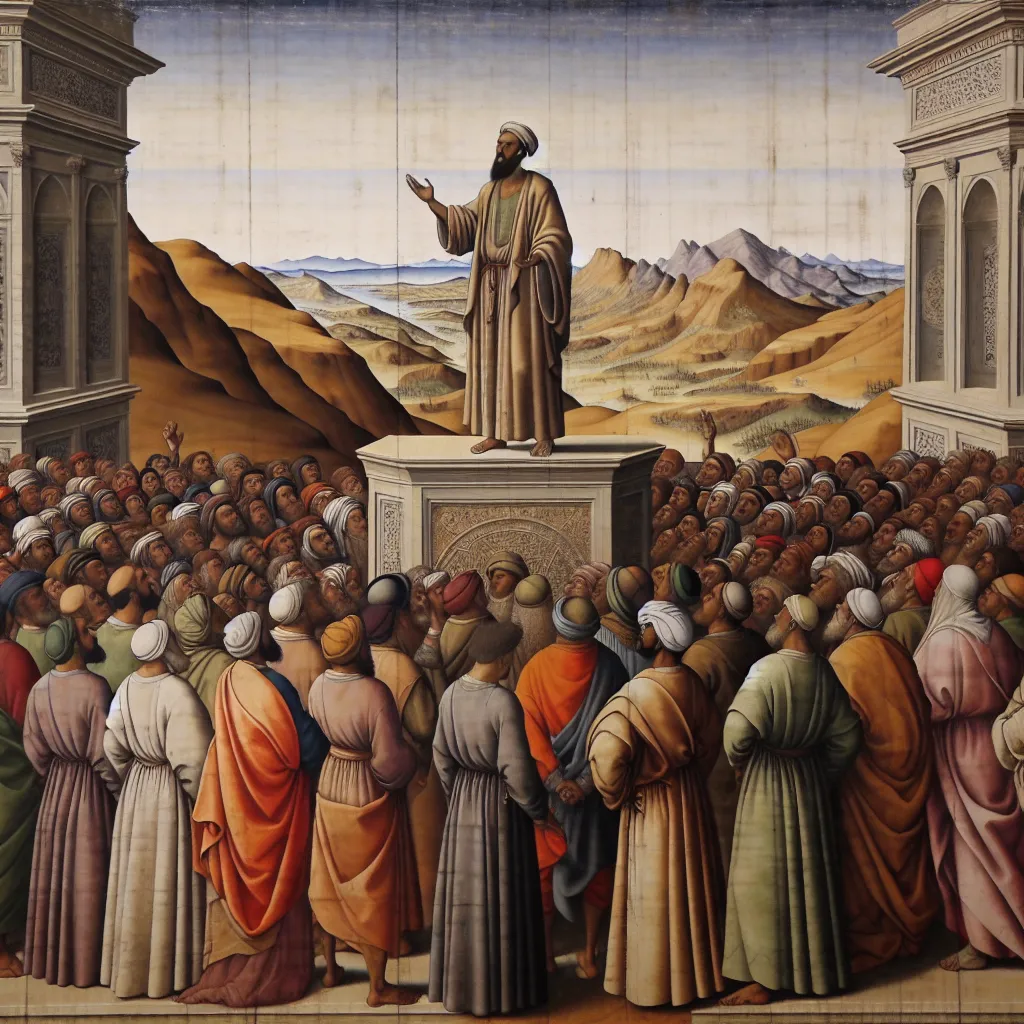
- Published on
- Authors

- Name
- You
The Significance of the Farewell Sermon: Muhammads Final Message to His Followers
The Farewell Sermon delivered by Prophet Muhammad (PBUH) on the 9th of Dhul Hijjah, 10 AH, during the Hajj pilgrimage, stands as a timeless legacy that reverberates through the annals of history. This profound address, occurring in the Uranah Valley of Mount Arafat, encapsulates the very essence of Islamic teachings and universal human values. As we delve into its profound truths, it becomes evident that its insights not only embody religious precepts but also extend into the realms of social justice, human rights, and ethical conduct.
Key Themes of the Farewell Sermon
Below, we dissect the core themes of this sermon to better understand its universal appeal:
1. Common Brotherhood
"All mankind is from Adam and Eve. An Arab has no superiority over a non-Arab, nor does a non-Arab have any superiority over an Arab."
In its profound simplicity, this statement underscores the essential unity and equality of all human beings. It emphasizes that the diversity of humankind is not a basis for hierarchy but a testament to the richness of creation.
2. Sanctity of Life and Property
"Your lives and your property are forbidden to one another till you meet your Lord, as the sanctity of this day, this month."
Here, Prophet Muhammad establishes clear ethical boundaries regarding the respect for life and property. This forms the foundation for principles of security, decency, and social order.
3. Rights of Women
"O People, it is true that you have certain rights with regard to your women, but they also have rights over you."
The sermon advocates for the respectful and equitable treatment of women, highlighting their dignified status in society and familial structures.
4. Eradication of Interest-Based Financial Exploitation
"All dues of interest shall henceforth be waived."
In denouncing usury, Prophet Muhammad emphasizes economic fairness and justice, advocating for an economy free from exploitation.
5. Abolishment of Pre-Islamic Practices
"All practices of the days of Jahiliya (ignorance) are now under my feet."
This thunderous declaration signifies a pivot away from the ignorance of pre-Islamic customs towards a society founded on enlightened principles.
6. Accountability
Prophet Muhammad stressed the concept of personal responsibility and accountability before the divine:
"Beware! No one committing a crime is responsible for it but himself."
7. Unity and Brotherhood
The sermon promotes an unshakeable sense of community:
"O People! Listen to my words and understand them. Know that every Muslim is a brother to every Muslim and that you are now one brotherhood."
Core Teachings and Their Contemporary Relevance
The Farewell Sermon is not merely of historical significance but is dynamically applicable to contemporary societal challenges. Let's explore how:
| Theme | Contemporary Relevance |
|---|---|
| Common Brotherhood | Promotes social cohesion amidst racial, ethnic, and cultural diversity. |
| Sanctity of Life and Property | Basis for human rights and civic laws safeguarding individuals and collective peace. |
| Rights of Women | Supports gender equality movements and legal frameworks protecting women’s rights. |
| Eradication of Interest | Inspires ethical financial practices and the foundations for sustainable economic systems. |
| Eradication of Ignorance | Encourages literacy, education, and cultural enlightenment. |
| Accountability | Fosters governance systems where justice is upheld, and individuals are responsible for their actions. |
| Unity and Brotherhood | Undermines divisions, fostering global unity and mutual support systems. |
Conclusion
Prophet Muhammads Farewell Sermon is a beacon that continually illuminates the path toward ethical and spiritual enlightenment. Its core teachings transcend the boundaries of time and space, offering guidance that is both deeply spiritual and profoundly practical. By embodying these teachings in our daily lives, we not only honor the enduring wisdom of the Prophet but also contribute to building a just, equitable, and harmonious world.
Drawn from the sands of Arafat to the digital screens of the 21st century, its call to unity, justice, and respect remains as relevant and vital today as it was over a millennium ago.
May its light guide our conscience and our communities towards a future of universal brotherhood and divine consciousness.
